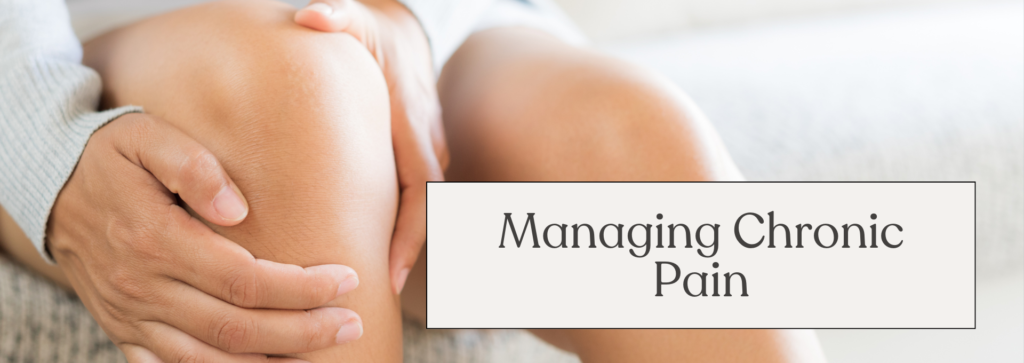How to Manage Chronic Pain

Living with chronic pain can be incredibly challenging, often feeling like an uphill battle that affects every aspect of your life. Millions of people worldwide face this daily struggle, and its impact goes beyond just physical discomfort—it also weighs heavily on mental well-being. At DiscovHER Health, we believe in a holistic approach that considers the whole person, not just the symptoms. By understanding and addressing the various factors that contribute to chronic pain, we can help you find relief and reclaim your life.
Understanding Chronic Pain
Chronic pain is defined as pain that persists for weeks, months, or even years beyond the typical recovery period. It can arise from a variety of conditions, including arthritis, fibromyalgia, neuropathy, and past injuries. Unlike acute pain, which serves as a warning signal for the body, chronic pain is complex, often involving both physical and emotional factors. This complexity requires a comprehensive approach for effective management—one that goes beyond traditional methods.
Nutrition As a Tool
What we eat plays a significant role in managing chronic pain. A diet rich in anti-inflammatory foods can help reduce inflammation and alleviate discomfort. Let’s explore some dietary choices that can support your pain management journey.
1. Anti-Inflammatory Foods:
- Omega-3 Fatty Acids: These essential fats, found in fatty fish like salmon, sardines, and mackerel, are known for their powerful anti-inflammatory properties. Incorporating omega-3s into your diet can help reduce inflammation and ease pain.
- Fruits and Vegetables: Leafy greens, berries, cherries, and cruciferous vegetables like broccoli and kale are packed with antioxidants and anti-inflammatory compounds. These foods can protect your body against oxidative stress, a key factor in chronic pain.
- Nuts and Seeds:Almonds, walnuts, chia seeds, and flaxseeds are rich in healthy fats and antioxidants that support overall health and reduce inflammation.
- Whole Grains: Opting for whole grains like quinoa, brown rice, and oats instead of refined grains can help maintain stable blood sugar levels and reduce inflammation, which is crucial for managing chronic pain.
2. Foods to Avoid:
- Processed Foods: Processed foods high in sugar and unhealthy fats can increase inflammation in the body. Limiting these foods can help reduce pain and improve your overall health.
- Refined Carbohydrates: Avoiding white bread, pastries, and other refined carbs is essential, as they can spike blood sugar levels and contribute to inflammation, worsening chronic pain.
3. Hydration:
- Staying well-hydrated is crucial for overall health, particularly when managing chronic pain. Adequate hydration can help alleviate joint stiffness and muscle cramps, making it easier to stay active and manage pain.
Stress Management Techniques
Stress is a known exacerbator of chronic pain, often leading to increased muscle tension and inflammation. Incorporating stress management techniques into your routine can help reduce pain and enhance mental well-being.
1. Mindfulness and Meditation:
- Mindfulness practices, such as meditation and deep breathing exercises, can help calm the mind and body, reducing stress and pain perception. Even dedicating just a few minutes each day to meditation can make a significant difference in how you manage pain.
2. Yoga and Gentle Movement:
- Engaging in yoga or gentle stretching exercises can improve flexibility, reduce muscle tension, and promote relaxation. These activities not only support physical health but also enhance mindfulness, helping you connect your mind and body in a way that reduces pain.
3. Cognitive Behavioral Therapy (CBT):
- Cognitive Behavioral Therapy is a proven method for changing negative thought patterns and behaviors that can exacerbate chronic pain. By improving coping skills, CBT helps reduce the emotional impact of chronic pain, making it easier to manage daily challenges.
4. Biofeedback:
- Biofeedback involves using electronic devices to monitor bodily functions like heart rate and muscle tension. This technique teaches individuals to control physiological responses to stress and pain, providing a powerful tool for managing chronic pain.
Lifestyle Modifications
Making certain lifestyle changes can significantly support pain management and improve your quality of life..
1. Regular Exercise:
- Regular physical activity is key to managing chronic pain. Low-impact exercises like swimming, walking, or cycling can improve cardiovascular health, boost endorphin levels, and reduce pain. It’s important to choose activities that are appropriate for your condition to avoid overexertion.
2. Sleep Hygiene:
- Prioritizing quality sleep is essential for managing chronic pain. Establishing a consistent sleep schedule and creating a restful environment can promote restorative sleep, which is critical for both physical recovery and mental well-being.
3. Social Support:
- Connecting with friends, family, or support groups provides emotional support and a sense of community. Sharing experiences with others who understand your journey can improve mental well-being and provide comfort during tough times.
Integrative Therapies
Incorporating complementary therapies into your pain management plan can enhance traditional strategies and provide additional relief.
1. Acupuncture:
- Acupuncture involves inserting thin needles into specific points on the body to relieve pain and promote healing. It’s an effective treatment for various types of chronic pain, including arthritis and fibromyalgia.
2. Massage Therapy:
- Regular massage therapy can help reduce muscle tension, improve circulation, and promote relaxation, making it a valuable tool for alleviating pain and stress.
3. Mindfulness Practice:
- Mindfulness meditation, which involves focusing on the present moment without judgment, can alter the brain’s response to pain signals. Regular practice can reduce stress, anxiety, and the perception of pain, leading to a more manageable experience.
4. Cryotherapy:
- Cryotherapy, which involves exposing the body to extremely cold temperatures for short periods, can reduce inflammation, numb nerve irritation, and relieve pain. It’s particularly useful for conditions like arthritis and muscle pain.
5. Hyperbaric Oxygen Therapy:
- HBOT involves breathing pure oxygen in a pressurized chamber, increasing oxygen levels in the blood and promoting healing in damaged tissues. This therapy can be particularly effective for chronic pain resulting from injuries or surgery.
6. Red Light Therapy:
- Red Light Therapy uses low-level wavelengths of red light to penetrate the skin and promote healing. It can reduce inflammation, increase circulation, and stimulate cellular repair, making it effective for treating muscle and joint pain, as well as skin conditions related to chronic pain like psoriasis or eczema.
Putting It All Together
Managing chronic pain requires a comprehensive and integrative approach that addresses both physical and emotional factors. By incorporating nutrition, stress management, lifestyle modifications, and complementary therapies, you can take proactive steps toward reducing pain and improving your overall well-being.
If you’re living with chronic pain and are interested in exploring integrative treatment options, schedule a consultation with us today. At DiscovHER Health, we’re here to support your journey to better health with personalized strategies designed to help you live a fuller, more comfortable life.
About Us
Jenna Perkins is a board certified Women’s Health and Gender Related Nurse Practitioner with extensive knowledge and experience in Urogynecology, Pelvic Pain, Sexual Health, and complex Gynecology. She is founder of DiscovHER Health, Northern Virginia’s premier destination for women’s healthcare and expertly curated products.
DiscovHER Health Offers cutting edge treatments
Pelvic Health + Wellness
- FormaV vaginal regeneration
- PTNS Bladder control
- Morpheus8v
- VTone
- SoLa Pelvic Therapy
- Dysis Colposcopy
- Pelvic Reset
Skincare | Face + Body
Body Toning + Tightening
Weight Loss Program
Where are we located?
We are located in Alexandria, Virginia and serve patients from all over the Mid-Atlantic including Washington DC, Alexandria, Baltimore, and Chevy Chase







Leave a Comment